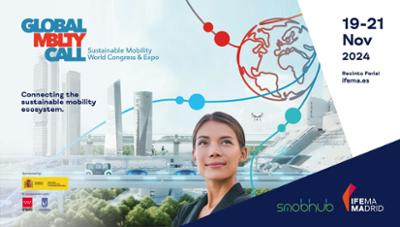

Madrid showcases its successful and forward-looking public transport at the Global Mobility Call

Mobility experts have outlined Madrid's approach to public transport that integrates sustainability, innovation and efficiency.
Madrid's public transport managers, metro and bus, are looking to the future with their sights set on improving night-time transport, electrification, autonomous driving, networks and payment method, and technological evolution supported by workers and engineering.
This was stated this Tuesday on the first day of the Global Mobility Call congress, organised by IFEMA MADRID and Smobhub, by the directors of the Municipal Transport Company (EMT), Alfonso Sánchez; of Metro, Ignacio Vázquez; of the Madrid Regional Transport Consortium (CRTM), Pablo Rodríguez, and the director of the School of Civil Engineering of the Polytechnic University of Madrid (UPM), José Miguel Atienza.
Regarding innovations in the EMT, Alfonso Sánchez explained how the night bus network has been extended with a circular line and how some lines have been extended to allow citizens to move around better at night for their leisure activities or work at night.
Sánchez also highlighted the electrification process, a "main objective" for the EMT, in which he mentioned the Carabanchel Operations Centre in which the company has 260 charging points and another 60 that will start operating at the end of the year in what is one of the largest electric charging stations in Europe, and the extension of the Bicimad electric bicycle service to other districts that demanded it.
He also highlighted as a "cutting-edge engineering" project the incorporation of hydrogen into EMT buses, which has become a benchmark in the public transport sector because it will produce its own energy needed to generate hydrogen.
On behalf of Metro de Madrid, its CEO, Ignacio Vázquez, stated that the underground's main challenge is to lay "the foundations of the metro of the future", to make it "more efficient, more flexible, with greater capacity and more sustainable".
According to Vázquez, the materialisation of this purpose is in plans such as the automation of line 6, which has involved the acquisition of 80 new trains "which will improve reliability, sustainability and capacity", and which will operate without drivers on lines 1 and 6.
The acquisition of these trains represents, he said, "the largest investment ever made in the history of Metro de Madrid, and he cited as part of the public-private partnership the project to renovate the superstructure of the 22.5 kilometres of track on line 6, which must be prepared for the arrival of the new automatic trains.
Another of Metro's necessary innovations are the platform doors for these driverless trains, a total of seventy of which have already been put out to tender.
According to the Metro executive, these innovations will mean that the system will soon reach a "balance" in terms of sustainability, the environment, economics, transport capacity and efficiency - "with far fewer incidents" - and in terms of flexibility.
Vázquez also underlined the work being done to reach an agreement with the social partners and the 7,200 Metro workers "without whom we would not be able to do this in such a short time".
The managing director of the CRTM, Pablo Rodríguez, for his part, has stated that it is advisable to continue with the management model with mobility operators in the field of public-private collaboration and in a system of co-governance which he considers "the most appropriate" and successful, and with which they have been working since 1985.
And within the framework of all the innovations linked to the means of transport, the director of the School of Civil Engineering of the UPM has stated that the challenge of the institution is "attracting talent" and preparing it to respond to the needs of public transport in Madrid in the medium term.
Atienza stressed that Madrid is "one of the best ecosystems in the world in infrastructure construction" and expressed a "positive message" about the mobility ecosystem, with a "very strong identity" around civil engineering, a profession in which the university works together with companies and public bodies with the idea that it is necessary to attract young students because "it is one of the keys to the future".
Content provided by Agencia EFE





